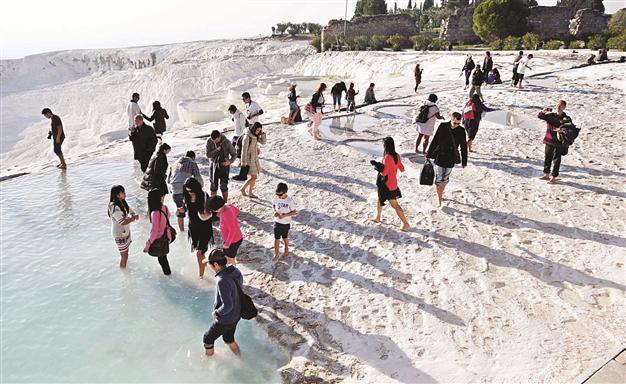Arab tourists discover Turkey’s ‘cotton castle’
ISTANBUL- Hürriyet Daily News

The number of Arab tourists increased due to Turkey’s popularity in the Islamic world, officials say. The most popular month for tourists in Pamukkale was August. AA photos
Pamukkale (meaning cotton castle), a natural formation in the Aegean province of Denizli and one of the popular tourist attractions in the country, has typically been visited by tourists from Europe. However, recent figures show that there has been a notable increase in the number of Arab tourists visiting the area.
Speaking to Anatolia news agency, Denizli Special Provincial Administration Secretary General Adem Oklu said Pamukkale, which is included on the UNESCO World Heritage List, had been visited by 1,602,195 tourists this year, 1,257,509 of whom are from foreign countries.
“The visitor profile shows that mostly European tourists visited Pamukkale in the past, but now the whole world is curious about it. Lots of tourists from Russia and the Far Eastern countries come here. In the recent period, the number of Arab tourists also increased due to Turkey’s popularity in the Islamic world. There has been a 100 percent increase in the number of Arab tourists this year.”
Oklu said that a similar increase had taken place in the number of tourists from the Turkic Republics. “With promotions, our goal is to increase the number of countries sending tourists to Pamukkale and to reach 2 million tourists annually,” he said.
The most popular month for tourists in Pamukkale was August. “We got the most number of visitors last year in July, but we reached 234,800 visitors this year in August, while this figure was previously 222,355,” Oklu said.
Information was also provided about the works continuing at the Pamukkale ancient ruins. “We have planted 175 flowers in the ancient pool and other landscape areas in the Pamukkale ruins, and we have cleaned the travertine. The restoration work is continuing in the second floor of the ancient theater under the leadership of an Italian excavation team. Also, we finished work and reopened the St. Philippe Bridge on the route to the St. Philippe Martyrdom, which is very important for faith tourism. Projects will continue to make Pamukkale Turkey’s cleanest, safest and the most beautiful area.”
Website in ArabicTo cater for the growing Arab tourist market, the Turkish Culture and Tourism Ministry recently opened a website in the Arabic language, www.tourismturkey.ae. The ministry’s director general for promotions, Cumhur Güven Taşbaşı, said the Arabic-language website would increase the number of tourists from the region visiting Turkey.
The website aims to make things easier for Arabs to acquire more information about Turkey, and works are also continuing to provide the same service to tourists from the Turkic republics.
Turkey also popular among Algerians In particular among Arab tourists, Turkey has also proved popular among Algerians, especially for the New Year holiday this year.
Due to the revolution that shook the country last year Tunisia, which had previously been favored by Algerians, fell behind countries like Turkey and France this year. Istanbul and the southern province of Antalya were particularly popular among Algerian tourists.
Other countries popular among Algerian tourists are France, Morocco, Dubai and Tunisia.
Algerian investor Es-Seyyid Rabih first visited the southern province of Antalya three years ago and told Anatolia news agency that he was now a devotee of the city. “Antalya is a very clean city; it looks like a western city rather than an eastern one. Service in the city is high-quality and the hotels are very comfortable.”
Tourism agency owner Hamdis Masinisa said at least 15 customers made reservations to go to Istanbul every day. “If the number of daily flights increased, this number would increase too,” he said, particularly calling on Algerian Airlines to increase its number of flights to Istanbul.
Masinisa said Istanbul was not only a touristic and economic route, but also a gateway to Asian countries such as China, Taiwan and Bangkok.
